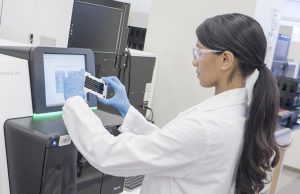Investors have seen no shortage of big watershed moments from DNA sequencing pioneer Illumina in recent years. The company's announcements of its refrigerator-sized human genome sequencing machines and its symbolic $1,000 human genome have grabbed the attention of observers and investors alike.
However, Illumina's latest move seems to be flying under the radar in comparison. The company has been quietly entering partnerships across the genomics industry to offer broader access to Illumina's global installed machine base to customers and competitors alike with one specific goal: improving patient outcomes via distributed diagnostics.
Why does this strategy deserve more investor attention?
To understand better, take a look at how Illumina generates revenue. While the company may be best known for its DNA sequencing instruments, that's only one piece of their revenue stream; indeed, their business model is reliant on the recurring revenue generated by selling the consumables their machines need to run, such as chemical reagents and test kits. The numbers are clear: in the first nine months of the year, Illumina reported $1.73 billion in consumables revenues but only $390 million in instrument revenue.
Of course, the amount of consumables revenue that Illumina can generate varies depending on machine. In particular, the company's mid-throughput NextSeq systems make perfect sense for its emerging distributed diagnostics strategy. These machines are more compact and less expensive than some of Illumina's other offerings, making them better matches for local and regional hospitals. By inking partnerships with other IVD test kit suppliers, Illumina can expand the utilization of its DNA sequencing machines and thereby its consumables, even if it does mean spreading the wealth a bit.
In short, Illumina clearly sees a bigger picture: genomics and omics industry that are healthier and robust are better for Illumina itself, even if it isn't directly supplying all the tests. By providing select partners with access to its platform, Illumina can increase the likelihood that hospitals across the country will buy one of its machines--which can be used to process any of Illumina's array of wholly-owned tests. Illumina's move into distributed diagnostics is a win-win for everyone and deserves real attention from investors.























